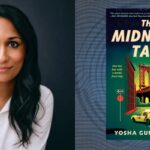
What if we replaced book blurbs with comparable titles?
I was in the Strand the other day, overstimulated and sort of bumping against tables and people and unable to focus on any one book, possibly because they were all breathtaking, unflinching, searingly witty-yet-emotionally penetrating tours de force, each written by one of our culture’s most indispensable voices. What I mean to say—and I realize I’m far from the first to make this observation—is that from the perspective of a reader, blurbs are pointless. Unless you want to find out who the writer is friends with (or who taught at their MFA program. Or who shares their agent. Or owes a favor to their editor).
The ouroboros aspect of blurbs isn’t even what bothers me, though, not really. It’s that they’re so profoundly unhelpful when it comes to how I think about selecting a new book. I have never thought to myself I’m in the mood for a luminous debut. I have thought, many times, something to the effect of I’m in the mood for The Idiot meets The Sellout. And internally, publishing describes books in exactly this way, in the form of comparable titles, or “an elevator pitch for your book.” Maybe this sounds cynical, but as a bookbuyer, I would also like an elevator pitch for your book!
Of course I want to read books that are triumphant, poignant, and devastating, but I also want to read different things depending on my mood. Sometimes reading I want a devastation, and sometimes I’ve got a more “scrolling glassy-eyed through Netflix in search of something that will take me back to the innocent feel-goodery of Parks and Rec” vibe. Actually, if someone could find me a book that’s Parks and Rec meets Mrs. Bridge, that would be amazing.
Jessie Gaynor
Jessie Gaynor is a senior editor at Lit Hub whose writing has appeared in McSweeney's, The New Yorker, The Paris Review, and elsewhere. Her debut novel, The Glow was published by Random House in 2023. You can buy it here.



















